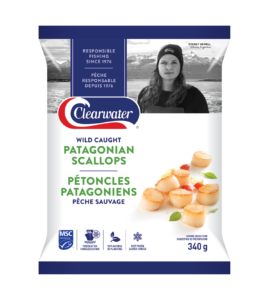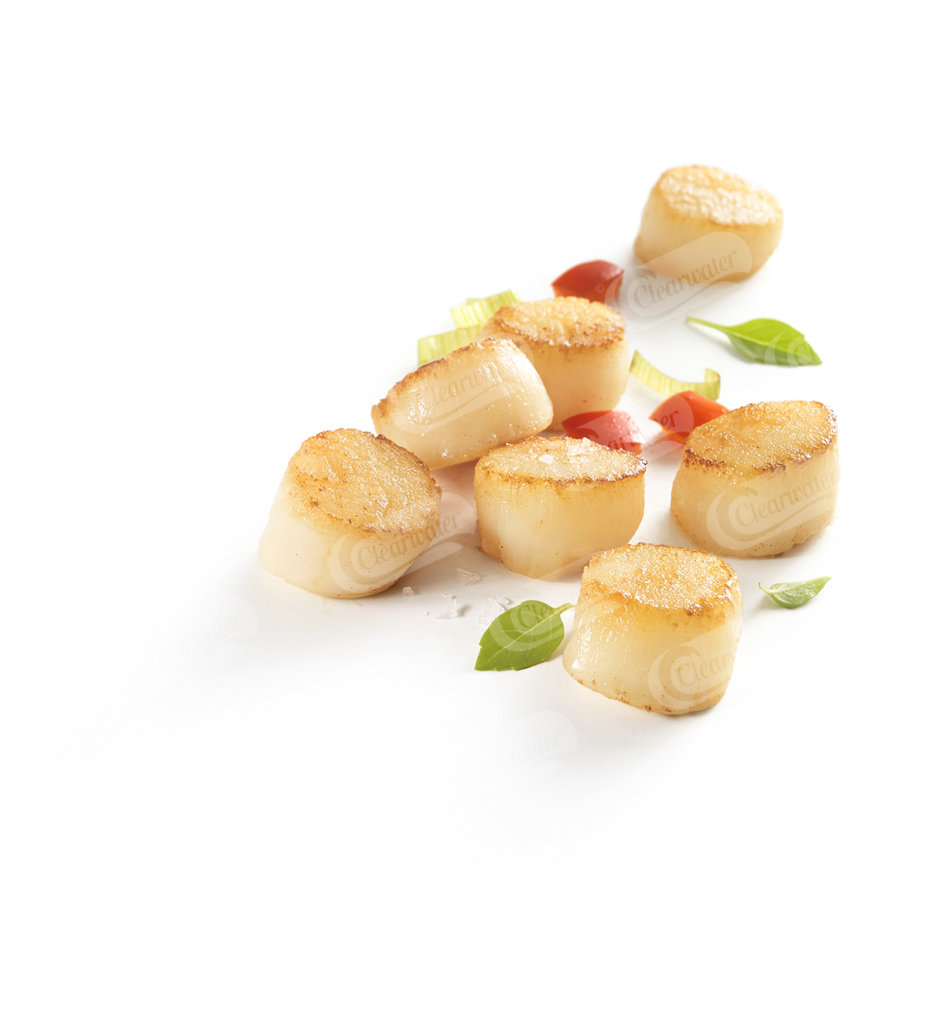%20144px(1).jpg)
100 percent natural, wild-caught. No chemicals or water added.
Sustainably harvested and certified by the Marine Stewardship Council.
Frozen-at-sea within an hour of catch to lock in freshness and flavor.
Convenient and easy to use only what you need.
Food safety and quality control are ensured through internationally recognized certifications.
Scallops are shucked, cleaned and individually quick frozen within an hour of harvesting, locking in freshness, flavor and texture.

Along with exceptional flavor and quality, wild seafood is also recognized as a healthy choice.
| Per 100g Serving | |
|---|---|
| Calories/Energy | 72 kcal/303 kJ |
| Fat | 0g |
| Saturated Fat | 0g |
| Trans Fat | 0g |
| Cholesterol | 20mg |
| Sodium | 270mg |
| Salt | 0.7g |
| Potassium | 320mg |
| Carbohydrate | 2g |
| Dietary Fiber | 0g |
| Sugars | 0g |
| Protein | 15g |
| Size Count | Canada | European Union | United States |
| 60 – 80 | 340 g Bag | 1 kg Bag | 12 oz Bag |
| 80 – 120 | |||
| 120 – 150 | |||
| 150+ |

Preparing Clearwater Frozen-at-Sea Patagonian Scallops:
1) Make sure the scallops are completely thawed – partially frozen scallops will continue to defrost in the pan, creating a pool of water and making it difficult to get a proper sear.
2) Add a neutral flavored cooking oil with a high smoke point, ideally grape seed or avocado (canola or olive oil will also work) to a skillet and place temperature on high until oil is heated.
3) Pat scallops dry with a clean kitchen towel or paper towel to remove any excess moisture.
4) Add scallops to the skillet one at a time, being careful not to overcrowd the cooking surface.
5) Sauté for approximately one minute (depending on size) or until golden brown. Turn scallops and cook to preferred doneness (additional 1 to 2 minutes for medium).
How do I store Clearwater Frozen-at-Sea Scallops?
Clearwater Frozen-at-Sea Patagonian Scallops should be stored in your freezer until you are ready to defrost them for use.
What’s the best way to defrost Clearwater Frozen-at-Sea Patagonian Scallops for optimum quality?
We recommend that you take the scallops out of the freezer 24 hours before they are needed and place them in a bag in your refrigerator. After the scallops have thawed, place them in a container lined with dry absorbent paper towel or a cloth.
How do I prepare Clearwater Frozen-at-Sea Patagonian Scallops?
1) Make sure the scallops are completely thawed – partially frozen scallops will continue to defrost in the pan, creating a pool of water and making it difficult to get a proper sear.
2) Add a neutral flavored cooking oil with a high smoke point, ideally grape seed or avocado (canola or olive oil will also work) to a skillet and place temperature on high until oil is heated.
3) Pat scallops dry with a clean kitchen towel or paper towel to remove any excess moisture.
4) Add scallops to the skillet one at a time, being careful not to overcrowd the cooking surface.
5) Sauté for approximately one minute (depending on size) or until golden brown. Turn scallops and cook to preferred doneness (additional 1 to 2 minutes for medium).
How long can I keep Clearwater Frozen-at-Sea Patagonian Scallops in my freezer?
Please refer to the best before date on the packaging.
How fresh are Clearwater Patagonian Scallops?
Clearwater’s state-of-the-art, factory vessels harvest, shuck and freeze scallops within an hour of harvesting, offering ultimate freshness and quality.
I already buy fresh scallops – how can Clearwater Frozen-at-Sea Patagonian Scallops be better?
You won’t find a fresher, purer scallop anywhere than Clearwater’s Frozen-at-Sea Patagonian Scallops! Clearwater’s Patagonian Scallops are quick frozen within an hour of catch, preserving their delicate, sweet flavor, texture and product purity for unbeatable freshness.
Have any preservatives been added?
Absolutely not! Clearwater Frozen-at-Sea Patagonian Scallops are 100% natural, with no chemical additives or preservatives.
How many Clearwater Frozen-at-Sea Patagonian Scallops can I purchase per pound?
Clearwater offers a variety options for purchasing scallops per pound: 60/80, 80/120, 120/150, 150+ and 150+SM. For example, a 60/80 count means there are 60 to 80 scallops per pound, 80/120 means 80 to 120 scallops per pound, etc.
What part of the scallop do we eat?
Scallops are considered bivalves, similar to clams and oysters, having two shells. These two shells are held together by the adductor muscle, which is the part of the scallop we typically eat.
Why are some scallops orange and not white?
Sometimes scallop meat may take on an orange hue, instead of a typically white color, which can be caused by an excess of a natural pigment found in a female scallop. This excess pigment is transferred into the adductor muscle. The quality of the meat and taste is not affected and some people even suggest that these orange colored scallops are more desirable.

To serve our customers better, our website content has been customized for different customer types based on their needs and interests. Have a suggestion on how we can serve you better, please let us know.
| Cookie | Duration | Description |
|---|---|---|
| cookielawinfo-checkbox-analytics | 11 months | This cookie is set by GDPR Cookie Consent plugin. The cookie is used to store the user consent for the cookies in the category "Analytics". |
| cookielawinfo-checkbox-functional | 11 months | The cookie is set by GDPR cookie consent to record the user consent for the cookies in the category "Functional". |
| cookielawinfo-checkbox-necessary | 11 months | This cookie is set by GDPR Cookie Consent plugin. The cookies is used to store the user consent for the cookies in the category "Necessary". |
| cookielawinfo-checkbox-others | 11 months | This cookie is set by GDPR Cookie Consent plugin. The cookie is used to store the user consent for the cookies in the category "Other. |
| cookielawinfo-checkbox-performance | 11 months | This cookie is set by GDPR Cookie Consent plugin. The cookie is used to store the user consent for the cookies in the category "Performance". |
| viewed_cookie_policy | 11 months | The cookie is set by the GDPR Cookie Consent plugin and is used to store whether or not user has consented to the use of cookies. It does not store any personal data. |
